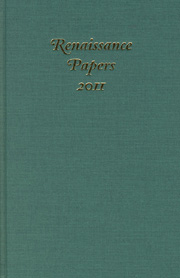Book contents
- Frontmatter
- Contents
- Dedication
- Walking, Waking, and the Armor of Light: Pauline Enactments in Henry IV, Part 1
- Costard's Revenge: Letters and Their Misdelivery in Love's Labour's Lost
- Productive Violence in Titus Andronicus
- Method in Marlowe's Massacre at Paris
- Ending Well: Mixed Genres and Audience Response in the London Theatrical Marketplace, 1604–06
- Birdlime: Sticky Entrapments in Renaissance Drama
- Sacrifice and Transcendence in Sir Philip Sidney's Astrophil and Stella
- The Quest for Certainty in Fulke Greville's A Treatie of Humane Learning
- Traces of the Masque in George Herbert's The Church
- Una Trinitas: Una and the Trinity in Book One of The Faerie Queene
- Reconsidering the 1599 Bishops' Ban on Satire
- Robert Bellarmine the Censor and Early-Modern Humanism
Reconsidering the 1599 Bishops' Ban on Satire
Published online by Cambridge University Press: 05 April 2013
- Frontmatter
- Contents
- Dedication
- Walking, Waking, and the Armor of Light: Pauline Enactments in Henry IV, Part 1
- Costard's Revenge: Letters and Their Misdelivery in Love's Labour's Lost
- Productive Violence in Titus Andronicus
- Method in Marlowe's Massacre at Paris
- Ending Well: Mixed Genres and Audience Response in the London Theatrical Marketplace, 1604–06
- Birdlime: Sticky Entrapments in Renaissance Drama
- Sacrifice and Transcendence in Sir Philip Sidney's Astrophil and Stella
- The Quest for Certainty in Fulke Greville's A Treatie of Humane Learning
- Traces of the Masque in George Herbert's The Church
- Una Trinitas: Una and the Trinity in Book One of The Faerie Queene
- Reconsidering the 1599 Bishops' Ban on Satire
- Robert Bellarmine the Censor and Early-Modern Humanism
Summary
In 1599, the Archbishop of Canterbury, John Whitgift, and the Bishop of London, Richard Bancroft, ordered the Stationers' Company to call in and burn various collections of satires. They further imposed a ban on satire in general, prohibiting future publication. A variety of theories have been proposed to account for the bishops' ban. Noting that a number of satires included in the order were of a gross sexual nature, John Peter suggests that the Bishops were motivated out of a concern for public morals. Richard McCabe, observing that these satires often attacked identifiable individuals, argues that the bishops were troubled by their libelous or seditious nature. Annabel Patterson contends that these satires violated the rules of “functional ambiguity” and were, in effect, excessively candid in their criticism of the Elizabethan state. And Cyndia Clegg, who argues that Elizabethan censorship practices are ad hoc in their application, finds a specific incident that explains the bishops' actions against satire and the other works identified in the Order. Pointing to the Earl of Essex's ill-fated trip to Ireland and his tenuous relationship with the Queen, Clegg contends that the ban is best understood as a protective measure on behalf of Essex by his “friend and ardent supporter,” Archbishop Whitgift.
- Type
- Chapter
- Information
- Renaissance Papers 2011 , pp. 131 - 140Publisher: Boydell & BrewerPrint publication year: 2012



